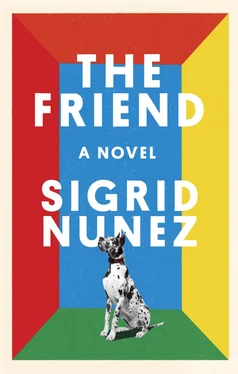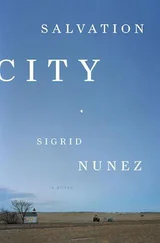The cloud has moved on and the light pours in again.
“You must be glad to be home,” says the woman.
The man pauses. “I’m certainly glad to be out of the hospital. It felt more like months than a couple of weeks. There really isn’t a whole lot to do on a psych ward. What made it even worse was that I couldn’t read, my concentration was shot, I’d forget each sentence as soon as I got to the end of it. And because I didn’t want people to know what happened, I couldn’t exactly have visitors. By the way, you’re still the only one outside the family who knows the whole story. For now I want to keep it that way.”
The woman nods.
“Not that it was a totally negative experience,” he adds. “And I kept reminding myself: When something bad happens to a writer, no matter how terrible, there’s always a silver lining.”
“Oh?” says the woman, sitting up straight. “Does that mean you’re going to write about it?”
“That’s certainly possible.”
“As fiction, or memoir?”
“I have no idea. It’s too soon. I’d need to get some distance from it.”
“And are you writing now? Have you been able to write?”
“Well, in fact, that was something I wanted to tell you about. We had a little workshop on the ward! Part of group therapy. There was this woman, a recreational therapist as they’re called. She had us write poetry instead of prose—because we didn’t have lots of time, she said, but no doubt also for other reasons. And she had everyone read what they wrote out loud. No analysis, no criticism. Just sharing, you know. Everyone wrote the most appalling stuff and everyone else gushed over it. All this dreadful poetry that wasn’t poetry—you can imagine the sort of thing. Voices trembling and cracking, some taking forever to get through it. And everyone was completely in earnest, you could tell how much it meant to them to have a chance to spill their guts and see that they could move people to tears. And oh, were there ever tears. And every poem got a round of applause. It was very strange. In all my years of teaching I’ve never come close to the kind of emotion I felt in that room. It was very moving, very strange.”
“It’s hard for me even to imagine you in that situation.”
“Believe me, the irony was not lost on me. At first I thought I didn’t want any part of it, just like I didn’t want any part of the coloring books they kept encouraging us to use—not just to pass the time but because coloring is supposed to reduce anxiety. But that was problematic because they all knew I was a writer and a writing teacher and I would’ve looked like the most awful snob. And as I say, life on the ward was so boring. I couldn’t read, and I refused to go on any outings—I was terrified of running into some person I knew and having to explain what I was doing at the movies or a museum with a nurse and a gaggle of nutcases. If nothing else, the workshop was a distraction, a way to kill some time. And then, to be completely honest, there was the therapist. She wasn’t gorgeous but she was young and she was kind of hot, and you know me. I wanted her attention. I might have been a mental patient, and old enough to be her gramps, but still I wanted to impress her. Really, I wanted to fuck her—not that there was any hope of that. Anyway, I hadn’t written poetry since I was in college, and there was something quite wonderful about turning back to it after all those years. I’ll remember that round of applause till I die. And the big surprise is, I’ve kept it up.”
“You’re writing poetry?” The woman feels another surge of panic as she thinks maybe she’ll be asked to read some of this poetry. Or, worse, sit and listen to him read it to her.
“Oh, nothing that I’d show anyone at this point,” the man says. “But right now it’s easier for me to be working on short things. The idea of writing anything longer frankly scares the hell out of me. Going back to the book I was working on—like a dog to its vomit! But enough about me. What have you been up to?”
She tells the man about a new course she’s teaching. Life and Story. Fiction as autobiography, autobiography as fiction. Writers like Proust, Isherwood, Duras, Knausgaard.
“Good luck getting the little fuckers to read Proust! And what about the piece you were working on? Did you finish?”
“No, I dropped it.”
“Oh no! Why?”
The woman shrugs. “It didn’t work out. Partly because I kept feeling guilty, like I was using the people I was writing about. I can’t explain exactly why I felt that way, but I did. And you know how it is with guilt, it’s like smoke and fire: you don’t feel it for nothing.”
“But that’s nonsense,” says the man. “Everything is material for the writer, it just depends on how you use it. Would I have encouraged you to write something I thought was wrong?”
“No. But the truth is that when you suggested that I write about those women you weren’t thinking about them but about me. It was something that would be good for me. I would get published, I would get read, I would get paid.”
“Yes, that’s what writers do, it’s called journalism. But you can’t tell me there weren’t other good reasons.”
“Maybe, but it doesn’t matter. Because the truth is, I couldn’t do it. I mean literally. I would write something like ‘Oksana is a twenty-two-year-old woman with a pale round face, high cheekbones, and blond-streaked hair who speaks with a light Russian accent.’ Then I would read what I wrote and feel nauseated. And I could not go on. The words would not come. I’d done all this research. I had all these notes. And I’d sit there and ask myself, what was I hoping to do with all this evidence of violence and cruelty, this catalog of atrocious details? Organize it into some engaging narrative? And if I did that, if I managed to find the precise words and the right tone—if I got the full true filthy horror of it down, in good clean prose—what would it mean? At the very least, I thought, writing should help me , the writer, understand better, but I knew this was wishful thinking. Writing wasn’t going to bring me any closer to understanding the kind of evil I was confronted with. And it wasn’t going to do anything for the victims—that sad fact was also inescapable. The only thing I could say for sure, and which I believe is true in general for projects like this, was that the important person involved is always the writer. And I started to feel there was something not just selfish but cruel—cold-blooded, if you will—about what I was doing. I hated the forensic attitude that seems to be a requirement of the genre.”
“Then maybe it would work better if you tried turning it into fiction,” the man says.
The woman flinches. “Even worse. Making vivid, interesting characters out of those girls and women? Mythologizing and novelizing their suffering? No. ”
The man gives an exaggerated sigh. “I know this argument, and I don’t buy it. If everyone felt the way you do, the world would remain ignorant about things it has every good reason to know. Writers have to bear witness, it’s their vocation. Some would say the writer has no higher calling than to bear witness to injustice and suffering.”
“I’ve been thinking a lot about this since Svetlana Alexievich won the Nobel,” says the woman. “The world is full of victims, says Alexievich. Ordinary people who experience horrific events but who are never heard and who end up forgotten. Her goal as a writer, she says, is to give these people words. But she doesn’t believe it can be done through fiction. We’re not living in the world of Chekhov anymore, she says, and fiction just isn’t very good at getting at our reality. We need documentary fiction, stories cut from ordinary, individual life. No invention. No authorial point of view. She calls her books novels in voices. I’ve also heard them called evidence novels. Most of her narrators are women. She thinks women make better narrators because they examine their lives and feelings in ways men usually don’t, more intensely and—why are you smiling?”
Читать дальше












